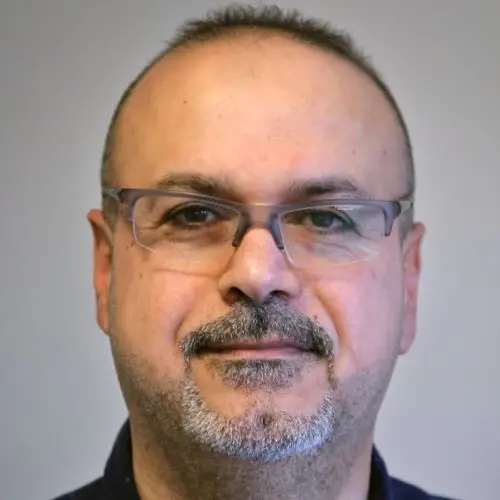Master Programme in Energy Systems 60 cr
In the future, more people with technical educations will be needed in order to meet the demands for efficient energy usage and renewable energy. During the course of the programme, you will expand your knowledge about energy systems as applied to regional, industrial and building contexts.
Credits
60 cr
Application code
HIG-19712
Application deadline
april 15, 2024
Form of education
Normal teaching
Language
English
Study time
september 2, 2024–juni 8, 2025
Prerequisites
A completed Bachelor's degree, corresponding to a Swedish Bachelor's degree (180 ECTS), or equivalent academic qualifications from an internationally recognised university.
The degree must be within the area of energy, mechanics, building or another adequate subject area. Also required is a minimum of 12 ects in Thermodynamics and Fluid mechanics.
English language proficiency equivalent to (the Swedish upper secondary school) English course B/6.
Selection
Higher education credit
Credits
60 cr
Application code
HIG-19703
Application deadline
januari 15, 2024
Form of education
Normal teaching
Language
English
Study time
september 2, 2024–juni 8, 2025
Prerequisites
A completed Bachelor's degree, corresponding to a Swedish Bachelor's degree (180 ECTS), or equivalent academic qualifications from an internationally recognised university.
The degree must be within the area of energy, mechanics, building or another adequate subject area. Also required is a minimum of 12 ects in Thermodynamics and Fluid mechanics.
English language proficiency equivalent to (the Swedish upper secondary school) English course B/6.
Selection
Higher education credit
About the programme
A strong emphasis is placed on dealing with energy engineering tasks with due consideration of technical, environmental and socioeconomic issues. Advanced optimization and simulation as well as measurement techniques are applied to identify, describe, quantify and find solutions to a diverse range of energy engineering problems. The major provide proficiency in project design and implementation, operation and maintenance, as well as in crucial phases of policy generation.
This study major has a total duration of nine months taught courses (60 credits) including a thesis project work (15 credits). The programme is open to applicants from all over the world. The programme language is English.
DEGREE
Upon successful completion and presentation/defense of Thesis project, students are awarded the Master of Engineering in the field of Energy Systems.
COURSE PROGRAMME
Energy Systems 7,5 ECTS
Building Energy Systems 7,5 ECTS
Renewable Energy Resources 7.5 ECTS
Energy Management 7,5 ECTS
Industrial Energy Systems 6 ECTS
Energy Systems Optimisation and Simulation 6 ECTS
Scientific Methods and Writing in Energy Engineering 3 ECTS
Thesis Project 15 ECTS
MORE INFORMATION
Ph. D. Nawzad Mardan nadman@hig.se
Degree
Master of Science (60 Credits)
Fields within the programme Year 1
The future needs sustainable energy systems
In order to create a sustainable living environment, the current energy systems shall be made more efficient both when it comes to usage and energy production.
Many fields of work
After you have completed the programme, you can work as an engineer within construction, development, project planning, contract and administration. Energy companies, consulting firms, the industry, the property business, etc. have a great demand for engineers to develop the energy systems of the future.
Labour market with long-term requirements
There is presently a great demand for students with a degree in energy-related fields, and the high demand is anticipated to continue in the foreseeable future. The reasons for this demand are metagenesis as well as a significant societal interest in creating sustainable energy systems, that is, to use the available resources as efficiently as possible while taking economy, environment and energy into consideration.
Utbildningen och FN:s globala mål
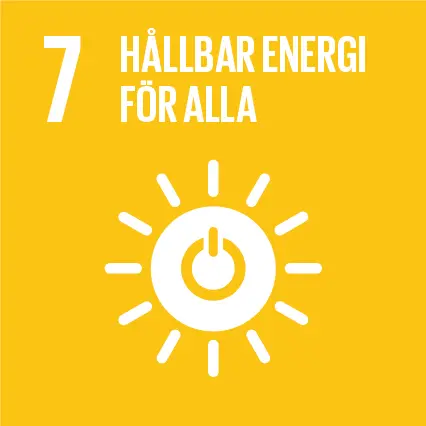
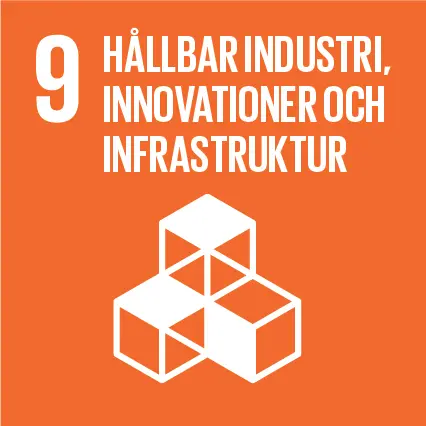
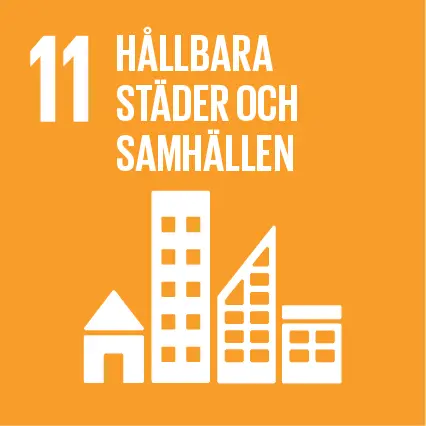
Läs mer om hur utbildningen är kopplad till FN:s globala mål
Under utbildningen lär du dig att utveckla lösningar för flera av FN:s globala mål, framför allt följande: Hållbar energi för alla, Hållbar industri, innovationer och infrastruktur och Hållbara städer och samhällen.
7 Hållbar energi för alla
Hållbar energi är ett viktigt område och en av dom viktigaste grundpelarna i vårt samhälle för att klara de klimatmål som är uppsatta för att minska våra utsläpp. Under utbildningens gång lär du dig om olika hållbara energislag, helhetsperspektiv på energisystem, långsiktighet samt främjande av resurshushållning. Du får lära dig kunskaper som krävs för att kunna vidta medvetna och aktiva åtgärder vid planering och uppbyggnad av nya energisystem samt vid ombyggnad av existerande energisystem. Sådana åtgärder kan vara förbättrad energihushållning, övergång till förnybara energislag och effektivisering av systemen.
9 Hållbar industri, innovationer och infrastruktur
Hållbar industri, innovationer och infrastruktur. Som student får du även inblick i nya lösningar baserad på den forskning som pågår inom området energieffektivisering både inom byggnader och industrin. Förbättrad energieffektivitet utgör nyckelkomponenter i omställningen mot hållbara energisystem, lokalt, regionalt såväl som globalt. Dessutom är de av central betydelse för att Sveriges företag långsiktigt ska vara konkurrenskraftiga och för att bibehålla och stärka sysselsättningsgraden.
11 Hållbara städer och samhällen
Under utbildningen lär du dig om delar av målet hållbara städer och samhällen vilket inkluderar till exempel renovering av befintliga bostäder och industri, användning av solceller och vindkraft och hållbar stadsutveckling i form av energieffektiva byggnader och användaranpassade inomhusmiljöer utformade för komfort, välbefinnande och produktivitet.
This page was last updated 2024-04-17
